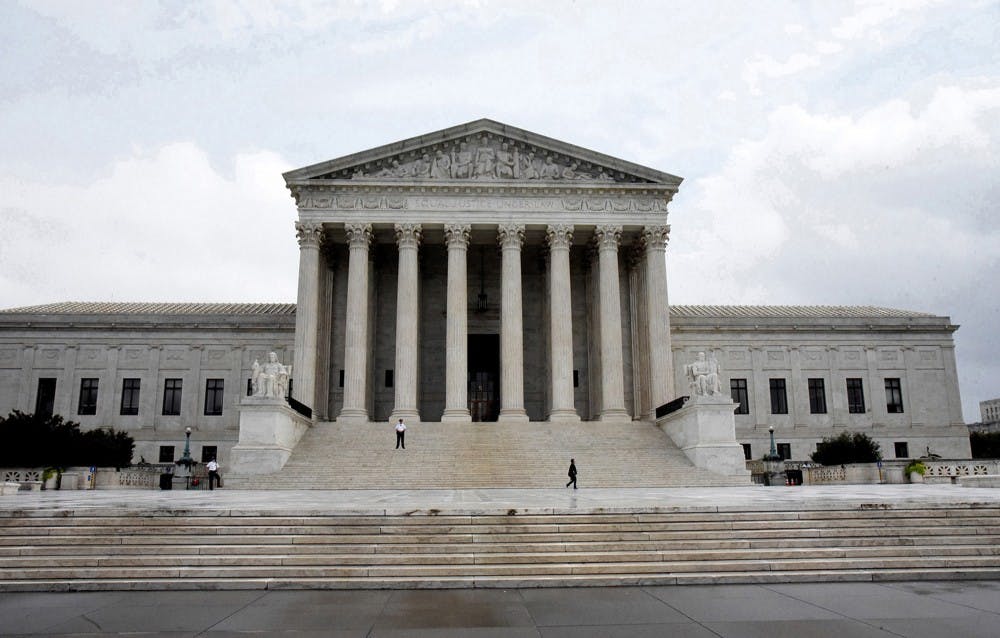By David G. Savage
Los Angeles Times
Heading into what looks to be a hard-fought presidential election, the Supreme Court will probably be asked to resolve a lingering but fundamental question about the creaky, little-understood electoral college system adopted in 1787.
At issue is whether states can require their appointed electors to cast ballots for the candidate favored by most of the state's voters on Election Day, or if electors may instead choose whomever they wish when convening a few weeks later. Rebellions by state electors have been a rarity in history, but a recent court ruling gave electors greater freedom to vote their conscience, and that could tip the outcome in a close election.
Article II of the Constitution created the electoral college to elect the president, rather than relying on a direct vote of the people. It says that states "shall appoint, in such manner as the Legislature thereof may direct, a number of electors" that reflects the population of the state. Those electors in turn would vote for the president and vice president.
Since the early 1800s, this system has operated as "largely a formality," the Washington state supreme court said in May. The electors, by pledge and often by law, cast their votes based on how their states vote. The candidate who wins the most votes in the state wins all the electoral votes, with the exception of Maine and Nebraska, where electoral votes can sometimes be split among candidates.
But last week, the 10th Circuit Court of Appeals in Denver upset the conventional understanding by ruling the electors have a "constitutional right" to vote as they wish for president, even if state law requires them to abide by the people's choice.
The appeals court ruled for Micheal Baca, a Democratic elector in Colorado, who in 2016 cast his ballot for Ohio Gov. John Kasich, even though Hillary Clinton won the majority of Colorado's votes. He was among several so-called faithless electors who in 2016 voted against the choice of their state's voters.
Writing for a 2-1 majority, Appellate Judge Carolyn McHugh focused on the words used in 1787.
"The definitions of elector, vote and ballot have a common theme: They all imply the right to make a choice or voice an individual opinion. We therefore agree with Mr. Baca that the use of these terms supports a determination that the electors, once appointed, are free to vote as they choose," she said in Baca vs. Colorado. "The text of the Constitution makes clear that the states do not have the constitutional authority to interfere with the presidential electors who exercise their constitutional right to vote for the president or vice president candidates of their choice."
Colorado's secretary of state, Jena Griswold, said the decision "takes power from Colorado voters and sets a dangerous precedent." State officials said they expect to appeal.
Los Angeles lawyer Jason Harrow, who represented Baca and the group Equal Citizens, said he will appeal the issue to the Supreme Court in a similar case from Washington state that resulted in an opposite ruling.
"We now have a split, and there's no need to wait longer," he said. "We want a decision before the 2020 election, and the sooner the better."
Unlike the 10th Circuit, the Washington state supreme court said the Constitution "gives to the state absolute authority in the manner of appointing electors ... . The power of electors to vote comes from the state, and the elector has no personal right to that role."
By an 8-1 vote, the state court rejected a constitutional claim brought on behalf of Levi Guerra and two other Democratic electors from Washington who were fined $1,000 because they did not cast their ballots for Hillary Clinton, who had won the state.
Harvard law professor Larry Lessig, who founded the Equal Citizens project and argued the Washington state case, said the aim is to "reform" the electoral college. "We know electoral college contests are going to be closer in the future than they have been in the past, and as they get closer and closer, even a small number of electors could change the result of an election," he said in response to the Colorado ruling. "Whether you think that's a good system or not, we believe it is critical to resolve it before it would decide an election."
Even if the Supreme Court receives an appeal in the weeks ahead in either the Washington or Colorado case, the justices are not likely to act on it for several months. They could opt to steer clear of the issue, but some legal experts said the specter of another Bush vs. Gore election dispute case could prompt them to decide the issue as soon as possible.
In December 2000, the Supreme Court chose to intervene in the ballot-recount battle in Florida, where the outcome would determine whether then-Texas Gov. George W. Bush or Vice President Al Gore would win the White House.
Ohio State law professor Ned Foley, an expert on the electoral college, said the justices "could easily avoid" deciding on the role of the electors, but "the strongest argument for taking it up now is they don't want to decide it on the Bush vs. Gore timetable."
He was referring to the fact that the justices had only a few days to decide a complicated dispute.




